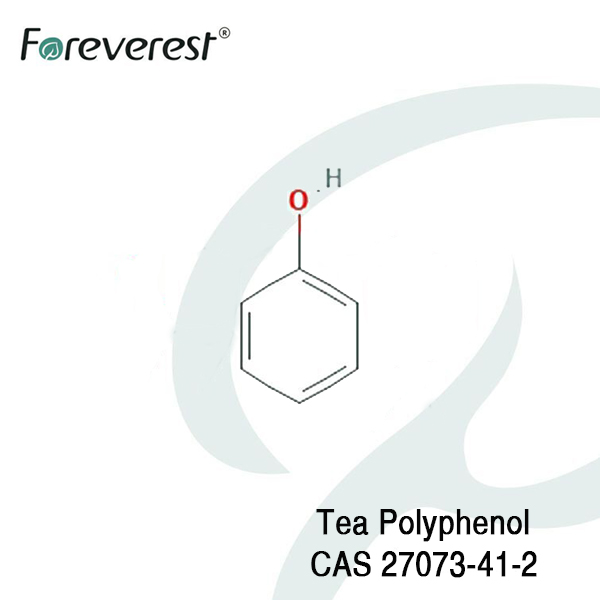Tea Polyphenol
Tea Polyphenol refers to a group of polyhydroxy phenolic compounds naturally found in tea. As an extract, it typically appears as a pale yellow powder with a characteristic tea odour. Among these, flavanols (catechins) constitute the major component, accounting for approximately 70% of the total tea polyphenols. Catechins are one of the key substances responsible for forming the colour, fragrance, and taste of tea.
Tea polyphenols, particularly polyphenols, flavonoids, catechins, and epigallocatechin gallate (EGCG), are powerful natural antioxidants. The antioxidant activity of EGCG in green tea extract is purportedly up to 100 times more powerful than that of vitamin C or E, effectively eliminating free radicals in the body.
Substance Identification
| Synonyms | henol homopolymer |
| CAS | 27073-41-2 |
| EINECS | N/A |
| FEMA | N/A |
| HS.CODE | N/A |
| Molecular Formula | C6-H6-O)x- |
| Moleclar Weight | 94.1124 |
Application & Uses
- Food & Beverages: Applied in the food field as a natural antioxidant, anti-staling agent, and anti-fading agent in various food and beverage products, to extend shelf life and enhance health benefits.
- Dietary Supplements: A key ingredient in the production of antioxidant, anti-aging, and immune-modulating health foods and dietary supplements.
- Cosmetics & Personal Care: As a cosmetic and daily chemical additive, it offers anti-wrinkle and anti-aging effects. It can dispel spots, prevent and treat skin diseases and sensitivity, as well as issues like decayed teeth, dental plaque, periodontitis, and halitosis. Furthermore, it can protect skin from harmful solar rays and has potential in skin cancer prevention research.
- Pharmaceutical & Health Sector: In the pharmaceutical field, it is used in the prevention and treatment of cardiovascular diseases and diabetes. It also possesses sterilisation and antiviral effects, contributing to relevant drug research and development.
Sales Specification
| ITEM | VALUE |
|---|---|
| Appearance | light yellow powder |
| Odor | tea perfume |
| Sieve, pass 80 mesh, % | 100 |
| Total Tea polyphenols, UV, % | ≤98.0 |
| Catechins, HPLC, % | ≥75 |
| EGCG, HPLC, % | ≥45 |
| Caffeine, HPLC, % | ≤0.5 |
| Ash, % | ≤3.0 |
| Loss on drying, % | ≤6.0 |
| Total heavy metals, ppm | ≤10.0 |
| As, ppm | ≤1.0 |
| Pb, ppm | ≤0.5 |
| Total plate count, cfu/g | ≤1000 |
| Yeast & mould, cfu/g | ≤100 |
Package
- Aluminum Foil Bag, 1kg net each, double-layer PE inside with Paper Carton outside
- Aluminum Foil Bag, 5kg net each, double-layer PE inside with Paper Carton outside
- Fiber Drum, 10kg net each, two-plastic bags inside available
- Fiber Drum, 25kg net each, two-plastic bags inside available
- Packaging can be made to orders
GHS Hazard Statements
| H-Code | H340/350 |
| P-Code | P203/280/281/318/405/501 |
| Response | no data available |
| Storage | no data available |
| Disposal | no data available |
Storage
- Environmental & Temperature Control:
- Store within the specified temperature range in a dry, well-ventilated area, and protect from light.
- A refrigerated room would be preferable for materials with a flash point lower than 37.8°C (100°F).
- Keep in a cool, well-ventilated place.
- Container Management & Prevention:
- Ensure containers are tightly closed and clearly labelled.
- Ground all equipment containing material to prevent static build-up.
- Hazard Isolation:
- Keep storage areas away from heat, sparks, open flames, and all sources of ignition.
- Flammable materials should be stored in a separate safety storage cabinet or room.
- Keep away from incompatible materials to prevent hazardous reactions.
- Safe Handling & Inspection:
- Handle carefully, and stack stably.
- After prolonged storage, always check quality before use.
- Compliance & Emergency Preparedness:
- Strictly comply with all safety regulations.
- Ensure emergency plans are in place for unforeseen circumstances.
Relation Products
Relation Articles
Remark
Start Purchasing
-
Minimum Order Quantity
Quote required -
Lead Time
Quote required -
Available Incoterms
Quote required -
Regional Availability
Quote required
